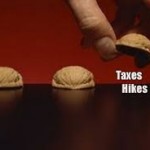On November 1st, the first European bank has passed along these negative interest rates to its retail customers.
So if you maintain a balance of more than 500,000 euros at Deutsche Skatbank of Germany, you now have the privilege of paying 0.25% per year… to the bank.
We’ve already seen this at the institutional level: commercial banks in Europe are paying the ECB negative interest on certain balances.
And large investors are paying European governments negative interest on certain bonds.
Now we’re seeing this effect bleed over into retail banking.
It’s starting with higher net worth individuals (the average guy doesn’t have half a million euros laying around in the bank). But the trend here is pretty clear – FINANCIAL REPRESSION is coming soon to a bank near you.
It almost seems like an episode from the Twilight Zone… or some bizarre parallel universe. That’s the investment environment we’re in now.
Bottom line: if you’re responsible with your money and set some aside for the future, you will be penalized. If you blow your savings and go into debt, you will be rewarded.
If we ask the question “cui bono”, the answer is pretty obvious: heavily indebted governments benefit substantially from zero (or negative) rates.
Case in Point:
the British government just announced that they would pay down some of their debt that they racked up nine decades ago.
In 1927, then Chancellor of the Exchequer Winston Churchill issued a series of bonds to consolidate and refinance much of the debt that Britain had racked up from World War I and before.
This debt is still outstanding to this day. And the British government is just starting to pay it down– about $350 million worth.
Think about it– $350 million was a lot of money in 1927. Thanks to decades of inflation, it’s practically a rounding error on government balance sheets today.
This is why they’re all so desperate to create inflation… and why they’ll stop at nothing to make it happen. (It remains to be seen whether they’ll be successful, but they are willing to go down swinging…)
What’s even more extraordinary is how they’re trying to convince everyone why inflation is necessary… and why negative rates are a good thing.
On the ECB’s own website, they say that negative interest rates will “benefit savers in the end because they support growth and thus create a climate in which interest rates can gradually return to higher levels.”
I’m not sure a more intellectually dishonest statement could be made; they’re essentially telling people that the path to prosperity is paved in debt and consumption, as opposed to savings and production.
LINK HERE to the source article
Disclaimer: The views or opinions expressed in this blog post may or may not be representative of the views or opinions of the Financial Repression Authority.

 “Financial repression always consists of a combination of different measures, which lead to a significant narrowing of the universe of investable assets for investors. Money, which in a more liberal investment environment would have flowed into other asset classes, is channeled in a different direction. The goal of financial repression is an indirect reduction of government debt by means of the targeted manipulation of the cost of government debt, most of the time accompanied by steady inflation. Financial repression is ultimately a government-imposed transfer of wealth .. A preferably “quiet debt reduction” is supposed to be achieved by the following measures:
“Financial repression always consists of a combination of different measures, which lead to a significant narrowing of the universe of investable assets for investors. Money, which in a more liberal investment environment would have flowed into other asset classes, is channeled in a different direction. The goal of financial repression is an indirect reduction of government debt by means of the targeted manipulation of the cost of government debt, most of the time accompanied by steady inflation. Financial repression is ultimately a government-imposed transfer of wealth .. A preferably “quiet debt reduction” is supposed to be achieved by the following measures: 



 11/04/2014 - Governments Using Financial Repression To Pay Down Debt
11/04/2014 - Governments Using Financial Repression To Pay Down Debt





 Hong Kong-based Fung Global Institute essay gives tribute to Ronald McKinnon who died earlier this month & who is author of the 1973 bookMoney and Capital in Economic Development .. a treatise on how governments that engage in financial repression hamper financial development .. they highlight how McKinnon was working on a related concept – a dollar-renminbi standard which was being designed to help alleviate the financial repression & fragmentation undermining global financial stability & growth .. “The notion that the dollar’s global dominance is contributing to financial repression represents a significant historical shift .. Speculative inflows of ‘hot’ money have weakened China’s macroeconomic tools and fueled ever more financial repression .. The world needs its two largest economies to work together to bolster global monetary stability. Together, China and the U.S. can alleviate financial repression, avert protectionist tendencies, and help maintain a strong foundation for global stability .. It is time for U.S. leaders to recognize that what former French Finance Minister Valéry Giscard d’Estaing called the ‘exorbitant privilege’ that the dollar’s global dominance affords America also entails considerable responsibility. Global monetary stability is, after all, a public good.”
Hong Kong-based Fung Global Institute essay gives tribute to Ronald McKinnon who died earlier this month & who is author of the 1973 bookMoney and Capital in Economic Development .. a treatise on how governments that engage in financial repression hamper financial development .. they highlight how McKinnon was working on a related concept – a dollar-renminbi standard which was being designed to help alleviate the financial repression & fragmentation undermining global financial stability & growth .. “The notion that the dollar’s global dominance is contributing to financial repression represents a significant historical shift .. Speculative inflows of ‘hot’ money have weakened China’s macroeconomic tools and fueled ever more financial repression .. The world needs its two largest economies to work together to bolster global monetary stability. Together, China and the U.S. can alleviate financial repression, avert protectionist tendencies, and help maintain a strong foundation for global stability .. It is time for U.S. leaders to recognize that what former French Finance Minister Valéry Giscard d’Estaing called the ‘exorbitant privilege’ that the dollar’s global dominance affords America also entails considerable responsibility. Global monetary stability is, after all, a public good.”























 Scotiabank’s Guy Haselmann thinks asset prices must adjust downward to meet new economic expectations for lower growth & inflation .. the problem is this recalibration is occurring quickly in an asset environment characterized by low liquidity – it is like the financial markets will overshoot to the downside .. “the process has just begun .. the unwind process has far to go” .. on quantitative easing & very low interest rates:
Scotiabank’s Guy Haselmann thinks asset prices must adjust downward to meet new economic expectations for lower growth & inflation .. the problem is this recalibration is occurring quickly in an asset environment characterized by low liquidity – it is like the financial markets will overshoot to the downside .. “the process has just begun .. the unwind process has far to go” .. on quantitative easing & very low interest rates:


